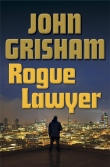
Текст книги "Gray Mountain"
Автор книги: John Grisham
Соавторы: John Grisham
Жанры:
Политические детективы
,сообщить о нарушении
Текущая страница: 2 (всего у книги 27 страниц)
On the financial front, things were unsteady but not altogether bleak. She had $31,000 in savings and no debt, except for three more months on the loft rental. If she downsized considerably and pieced together income through part-time jobs, she could possibly hang on until the storm blew over. Assuming, of course, that the end of the world did not materialize. She couldn’t see herself waiting tables or selling shoes, but then she had never dreamed her prestigious career would end so abruptly. The city would soon be crowded with even more waitresses and retail clerks holding graduate degrees.
Back to Big Law. Her goal had been to make partner by the age of thirty-five, one of few women at the top, and nail down a corner office from which she would play hardball with the boys. She would have a secretary, an assistant, some paralegals, and a driver on call, a golden expense account, and a designer wardrobe. The hundred-hour workweeks would shrink into something manageable. She would knock down two million plus a year for twenty years, then retire and travel the world. Along the way she would pick up a husband, a kid or two, and life would be grand.
It had all been planned and was seemingly within reach.
She met Izabelle for martinis in the lobby of the Mercer Hotel, four blocks from her loft. They had invited Ben but he had a new wife and was otherwise distracted. The furloughs were having opposite effects. Samantha was in the process of coping, even shrugging it off and thinking about ways to survive. She was lucky, though, because she had no student debt. Her parents had the money for a fine education. But Izabelle was choking under old loans and agonizing over the future. She slurped her martini and the gin went straight to her brain.
“I can’t go a year with no income,” she said. “Can you?”
“Possibly,” Samantha said. “If I shrink everything and live off soup, I can scrimp along and stay in the city.”
“Not me,” Izabelle said sadly as she took another gulp. “I know this guy in Litigation. He got the furlough deal last Friday. He’s already called five of the nonprofits, and all five said the internships had been grabbed by other associates. Can you believe it? So he called HR and raised hell and they said they’re still working on the list, still getting inquiries from nonprofits looking for extremely cheap labor. So not only do we get sacked, but the little furlough scheme is not working too well. No one wants us even if we’ll work for free. That’s pretty sick.”
Samantha took a tiny sip and savored the numbing liquid. “I’m not inclined to take the furlough deal.”
“Then what do you do about health insurance? You can’t go naked.”
“Maybe I can.”
“But if you get sick, you’ll lose everything.”
“I don’t have much.”
“That’s foolish, Sam.” Another pull on the martini, though a bit smaller. “So you’re giving up on a bright future at dear old Scully & Pershing.”
“The firm has given up on me, and you, and a lot of others. There has to be a better place to work, and a better way to make a living.”
“I’ll drink to that.” A waitress appeared, and they ordered another round.
3
Samantha slept for twelve hours and woke up with an overwhelming urge to flee the city. Lying in bed and staring at the ancient wooden beams across her ceiling, she replayed the last month or so and realized she had not left Manhattan in seven weeks. A long August weekend in Southampton had been abruptly canceled by Andy Grubman, and instead of sleeping and partying she had spent Saturday and Sunday at the office proofreading contracts a foot thick.
Seven weeks. She showered quickly and stuffed a suitcase with some essentials. At ten, she boarded a train at Penn Station and left a voice message on Blythe’s cell. She was headed to D.C. for a few days. Call me if you get the ax.
As the train rolled through New Jersey, curiosity got the best of her. She sent an e-mail to the Lake Erie Defense Fund, and one to the Pittsburgh Women’s Shelter. Thirty minutes passed without replies as she read the Times. Not a word about the carnage at S&P as the economic meltdown continued unabated. Massive layoffs at financial firms. Banks refusing to lend while other banks were closing their doors. Congress chasing its tail. Obama blaming Bush. McCain/Palin blaming the Democrats. She checked her laptop and saw another e-mail from happy Anna in HR. Six new nonprofits had emerged and joined the party. Better get busy!
The Women’s Shelter sent back a pleasant note, thanking Ms. Kofer for her interest but the position had just been filled. Five minutes later, the good folks fighting to save Lake Erie said pretty much the same thing. Feeling the challenge now, Samantha sent a flurry of e-mails to five more nonprofits on Anna’s list, then sent one to Anna politely asking her to become a bit more enthusiastic with her updates. Between Philadelphia and Wilmington, Marshkeepers down in Louisiana said no. The Georgia Innocence Project said no. The Immigrant Initiative in Tampa said no. The Death Penalty Clearinghouse said no, and Legal Aid of Greater St. Louis said no. No, but thanks for your interest. The intern positions have already been filled.
Zero for seven. She couldn’t land a job as a volunteer!
She got a cab at Union Station near the Capitol and sank low in the rear seat as it inched through D.C. traffic. Block after block of government offices, headquarters for a thousand organizations and associations, hotels and gleaming new condos, sprawling offices packed with lawyers and lobbyists, the sidewalks crawling with busy people hurrying back and forth, urgently pursuing the nation’s business as the world teetered on the brink. She had lived the first twenty-two years of her life in D.C., but now found it boring. It still attracted bright young people in droves, but all they talked about was politics and real estate. The lobbyists were the worst. They now outnumbered the lawyers and politicians combined, and they ran the city. They owned Congress and thus controlled the money, and over cocktails or dinner they would bore you to death with the details of their latest heroic efforts to secure a bit of pork or rewrite a loophole in the tax code. Every friend from childhood and Georgetown earned a paycheck that in some way had federal dollars attached to it. Her own mother earned $145,000 a year as a lawyer at Justice.
Samantha wasn’t sure how her father earned his money. She decided to visit him first. Her mother worked long hours and wouldn’t be home until after dark. Samantha let herself into her mother’s apartment, left her suitcase, and took the same cab across the Potomac to Old Town in Alexandria. Her father was waiting with a hug and a smile and all the time in the world. He had moved into a much nicer building and renamed his firm the Kofer Group. “Sounds like a bunch of lobbyists,” she said as she looked around his well-appointed reception area.
“Oh no,” Marshall said. “We stay away from that circus over there,” he said, pointing in the general direction of D.C. as if it were a ghetto. They were walking down a hallway, passing open doors to small offices.
Then what exactly do you do, Dad? But she decided to postpone that question. He led her into a large corner office with a distant view of the Potomac River, not unlike Andy Grubman’s from another lifetime. They sat in leather chairs around a small table as a secretary fetched coffee.
“How are you doing?” he asked sincerely, a hand on her knee as if she’d fallen down the steps.
“I’m okay,” Samantha said and immediately felt her throat tighten. Get a grip. She swallowed hard and said, “It’s just been so sudden. A month ago things were fine, you know, on track, no problems. A lot of hours but that’s life on the treadmill. Then we started hearing rumors, distant drumbeats of things going wrong. It seems so sudden now.”
“Yes it does. This crash is more like a bomb.”
The coffee arrived on a tray and the secretary closed the door as she left.
“Do you read Trottman?” he asked.
“Who?”
“Okay, he writes a weekly newsletter on the markets and politics. Based here in D.C. and been around for some time, and he’s pretty good. Six months ago he predicted a meltdown in the sub-prime mortgage game, said it’s been building for years and so on, said there would be a crash and a major recession. He advised everyone to get out of the markets, all markets.”
“Did you?”
“Didn’t have anything in the markets, really. And if I did I’m not sure I would have taken his advice. Six months ago we were living the dream and real estate values would never decline. Credit was dirt cheap and everybody was borrowing heavily. The sky was the limit.”
“What does this Trottman say now?”
“Well, when he’s not crowing, he’s telling the Fed what to do. He’s predicting a major recession, and worldwide, but nothing like 1929. He thinks the markets will sink by half, unemployment will jump to new levels, the Democrats will win in November, a couple of major banks will go under, a lot of fear and uncertainty but the world will survive somehow. What do you hear up there, on Wall Street? You’re in the thick of things. Or you were, I suppose.”
He was wearing the same style of black tasseled loafers he’d worn forever. The dark suit was probably handmade, just like in the glory days. Worsted wool and very expensive. Silk tie with perfect knot. Cuff links. The first time she visited him in prison he wore a khaki shirt and olive dungarees, his standard uniform, and he’d whined about how much he missed his wardrobe. Marshall Kofer had always loved fine clothes, and now that he was back he was clearly spending some money.
“Nothing but panic,” she said. “Two suicides yesterday, according to the Times.”
“Have you had lunch?”
“I had a sandwich on the train.”
“Let’s do dinner, just the two of us.”
“I promised Mom, but I’m free for lunch tomorrow.”
“Booked. How is Karen?” he asked. According to him, her parents had a friendly chat at least once a month by phone. According to her mother, the conversations happened about once a year. Marshall would like to be friends, but Karen carried too much baggage. Samantha had never tried to broker a truce.
“She’s fine, I guess. Works hard and all that.”
“Is she seeing anyone?”
“I don’t ask. What about you?”
The young and pretty paralegal ditched him two months after he landed in prison, so Marshall had been single for many years. Single but seldom alone. He was almost sixty, still fit and thin with slicked-back gray hair and a killer smile. “Oh, I’m still in the game,” he said with a laugh. “And you. Anybody significant?”
“No, Dad, afraid not. I’ve spent the last three years in a cave while the world went by. I’m twenty-nine and a virgin once again.”
“No need to go there. How long are you in town?”
“I just got here. I don’t know. I told you about the furlough scheme the firm is offering and I’m checking that out.”
“You volunteer for a year, then get your old job back without losing rank?”
“Something like that.”
“Smells bad. You don’t really trust those guys, do you?”
She took a deep breath, then a sip of coffee. At this point, the conversation could spiral down into topics she couldn’t stomach at the moment. “No, not really. I can honestly say that I do not trust the partners who run Scully & Pershing. No.”
Marshall was already shaking his head, happily agreeing with her. “And you don’t really want to go back there, not now, not twelve months from now. Right?”
“I’m not sure what I’ll be thinking in twelve months, but I can’t see much of a future at the firm.”
“Right, right.” He set his coffee cup on the table and leaned forward. “Look, Samantha, I can offer you a job right here, one that will pay well and keep you busy for a year or so while you sort things out. Maybe it can become permanent, maybe not, but you’ll have plenty of time to make that decision. You will not be practicing law, real law as they say, but then I’m not sure you’ve been doing much of that for the past three years.”
“Mom said you have two partners and that they’ve also been disbarred.”
He faked a laugh, but the truth was uncomfortable. “Karen would say that, wouldn’t she? But yes, Samantha, there are three of us here, all convicted, sentenced, disbarred, incarcerated, and, I’m happy to say, fully rehabilitated.”
“I’m sorry, Dad, but I can’t see myself working for a firm run by three disbarred lawyers.”
Marshall’s shoulders sagged a bit. The smile went away.
“It’s not really a law firm, right?”
“Right. We can’t practice because we have not been reinstated.”
“Then what do you do?”
He bounced back quickly and said, “We make a lot of money, dear. We work as consultants.”
“Everybody is a consultant, Dad. Who do you consult and what do you tell them?”
“Are you familiar with litigation funders?”
“For discussion purposes, let’s say the answer is no.”
“Okay, litigation funders are private companies that raise money from their investors to buy into big lawsuits. For example, let’s say a small software company is convinced one of the big guys, say Microsoft, has stolen its software, but there’s no way the small company can afford to sue Microsoft and go toe-to-toe in court. Impossible. So the small company goes to a litigation fund, and the fund reviews the case, and if it has merit, then the fund puts up some serious cash for legal fees and expenses. Ten million, twenty million, doesn’t really matter. There’s plenty of cash. The fund of course gets a piece of the action. The fight becomes a fair one, and there’s usually a lucrative settlement. Our job here is to advise the litigation funds on whether or not they should get involved. Not all potential lawsuits should be pursued, not even in this country. My two partners, non-equity partners, I might add, were also experts in complex tort litigation until, shall we say, they were asked to leave the legal profession. Our business is booming, regardless of this little recession. In fact, we think this current mess will actually help our business. A lot of banks are about to get sued, and for huge sums.”
Samantha listened, sipped her coffee, and reminded herself that she was listening to a man who once cajoled millions out of jurors on a regular basis.
“What do you think?” he asked.
Sounds dreadful, she thought, but kept frowning as if deep in thought. “Interesting,” she managed to say.
“We see huge growth potential,” he said.
Yes, and with three ex-cons running the show it’s only a matter of time before there’s trouble. “I don’t know beans about litigation, Dad. I’ve always tried to stay away from it. I was in finance, remember?”
“Oh, you’ll pick it up. I’ll teach you, Samantha. We’ll have a ball. Give it a shot. Try it for a few months while you sort things out.”
“But I’m not disbarred yet,” she said. They both laughed, but it really wasn’t that funny. “I’ll think about it, Dad. Thanks.”
“You’ll fit in, I promise. Forty hours a week, a nice office, nice people. It’ll sure beat the rat race in New York.”
“But New York is home, Dad. Not D.C.”
“Okay, okay. I’m not going to push. The offer is on the table.”
“And I appreciate it.”
A secretary tapped on the door and stuck her head in. “Your four o’clock meeting, sir.”
Marshall frowned as he glanced at his watch to confirm the time. “I’ll be there in a moment,” he said and she disappeared. Samantha grabbed her purse and said, “I need to be going.”
“No rush, dear. It can wait.”
“I know you’re busy. I’ll see you tomorrow for lunch.”
“We’ll have some fun. Say hello to Karen. I’d love to see her.”
Not a chance. “Sure, Dad. See you tomorrow.”
They hugged by the door and she hurried away.
The eighth rejection came from the Chesapeake Society in Baltimore, and the ninth came from an outfit fighting to save the redwoods in Northern California. Never, in her privileged life, had Samantha Kofer been rejected nine times in one day from any endeavor. Nor in a week, nor a month. She was not sure she could handle number ten.
She was sipping decaf in the café at Kramerbooks near Dupont Circle, waiting and swapping e-mails with friends. Blythe still had a job but things were changing by the hour. She passed along the gossip that her firm, the world’s fourth largest, was also slaughtering associates right and left, and that it too had cooked up the same furlough scheme to dump its brightest on as many broke and struggling nonprofits as possible. She wrote: “Must be 1000s out there knocking doors begging for work.”
Samantha didn’t have the spine to admit she was zero for nine.
Then number ten chimed in. It was a terse message from a Mattie Wyatt at Mountain Legal Aid Clinic in Brady, Virginia: “If you can talk right now call my cell,” and she gave her number. After nine straight stiff-arms, it felt like an invitation to the Inauguration.
Samantha took a deep breath and another sip, glanced around to make sure she could not be heard, as if the other customers were concerned with her business, then punched the numbers of her cell phone.
4
The Mountain Legal Aid Clinic ran its low-budget operations from an abandoned hardware store on Main Street in Brady, Virginia, population twenty-two hundred and declining with each census. Brady was in southwest Virginia, Appalachia, the coal country. From the affluent D.C. suburbs of northern Virginia, Brady was about three hundred miles away in distance and a century in time.
Mattie Wyatt had been the clinic’s executive director from the day she founded the organization twenty-six years earlier. She picked up her cell phone and gave her usual greeting: “Mattie Wyatt.”
A somewhat timid voice on the other end said, “Yes, this is Samantha Kofer. I just got your e-mail.”
“Thank you, Ms. Kofer. I got your inquiry this afternoon, along with some others. Looks like things are pretty tough at some of these big law firms.”
“You could say that, yes.”
“Well, we’ve never had an intern from one of the big New York firms, but we could always use some help around here. There’s no shortage of poor folk and their problems. You ever been to southwest Virginia?”
Samantha had not. She had seen the world but had never ventured into Appalachia. “I’m afraid not,” she said as politely as possible. Mattie’s voice was friendly, her accent slightly twangy, and Samantha decided that her best manners were needed.
“Well you’re in for a jolt,” Mattie said. “Look, Ms. Kofer, I’ve had three of you guys send e-mails today and we don’t have room for three rookies who are clueless, know what I mean? So the only way I know to pick one is to do interviews. Can you come down here for a look around? The other two said they would try. I think one is from your law firm.”
“Well, sure, I could drive down,” Samantha said. What else could she say? Any hint of reluctance and she would indeed pick up the tenth rejection. “When did you have in mind?”
“Tomorrow, the next day, whenever. I didn’t expect to get flooded with laid-off lawyers scrambling to find work, even if it doesn’t pay. Suddenly there’s competition for the job, so I guess the sooner the better. New York is a long way off.”
“I’m actually in D.C. I can be there tomorrow afternoon, I suppose.”
“Okay. I don’t have much time to spend with interviews, so I’ll likely just hire the first one to show up and cancel the rest. That is, if I like the first one.”
Samantha closed her eyes for a few seconds and tried to put it all in perspective. Yesterday morning she had arrived at her desk in the world’s largest law firm, one that paid her handsomely and had the promise of a long, profitable career. Now, about thirty hours later, she was unemployed, sitting in the café at Kramerbooks and trying to hustle her way into a temporary, unpaid gig about as deep in the boonies as one could possibly wander.
Mattie continued, “I drove to D.C. last year for a conference, took me six hours. You wanna say around four tomorrow afternoon?”
“Sure. I’ll see you then. And thanks Ms. Wyatt.”
“No, thank you, and it’s Mattie.”
Samantha searched the Web and found a site for the legal aid clinic. Its mission was simple: “Provide free legal services for low-income clients in southwest Virginia.” Its areas of service included domestic relations, debt relief, housing, health care, education, and benefits due to black lung disease. Her legal education had touched briefly on some of these specialties; her career had not. The clinic did not deal with criminal matters. In addition to Mattie Wyatt, there was another attorney, a paralegal, a receptionist, all women.
Samantha decided she would discuss it with her mother, then sleep on it. She did not own a car and, frankly, could not see herself wasting the time to travel to Appalachia. Waiting tables in SoHo was looking better. As she stared at her laptop, the homeless shelter in Louisville checked in with a polite no. Ten rejections in one day. That was enough: she would end her quest to save the world.
Karen Kofer arrived at Firefly just after seven. Her eyes watered as she hugged her only child, and after a few words of sympathy Samantha asked her to please stop. They went to the bar and ordered wine while they waited for a table. Karen was fifty-five and aging beautifully. She spent most of her cash on clothes and was always trendy, even chic. As long as Samantha could remember, her mother had complained about the lack of style around her at Justice, as if it were her job to spice things up. She had been single for ten years and there had been no shortage of men, but never the right one. Out of habit, she sized up her daughter, from earrings down to shoes, and made her assessment in a matter of seconds. No comment. Samantha didn’t really care. On this awful day, she had other things on her mind.
“Dad says hello,” she said in an effort to steer the conversation away from the urgent matters at Justice.
“Oh, you’ve seen him?” Karen asked, eyebrows arched, radar suddenly on high alert.
“Yes. I stopped by his office. He seems to be doing well, looking good, expanding his business, he says.”
“Did he offer you a job?”
“He did. Starting right away, forty hours a week in an office filled with wonderful people.”
“They’ve all been disbarred, you know?”
“Yes, you told me that.”
“It seems to be legitimate, for now anyway. Surely you’re not thinking about working for Marshall. It’s a gang of thieves and they’ll probably be in trouble before long.”
“So you’re watching them?”
“Let’s say I have friends, Samantha. Lots of friends in the right places.”
“And you’d like to see him busted again?”
“No, dear, I’m over your father. We split years ago and it took a long time to recover. He hid assets and screwed me in the divorce, but I finally let it go. I have a good life and I’ll not waste negative energy on Marshall Kofer.”
In tandem, they sipped their wine and watched the bartender, a hunky boy in his mid-twenties in a tight black T-shirt.
“No, Mom, I’m not going to work for Dad. It would be a disaster.”
The hostess led them to their table and a waiter poured ice water. When they were alone, Karen said, “I’m so sorry, Samantha. I can’t believe this.”
“Please, Mom, that’s enough.”
“I know, but I’m your mother and I can’t help myself.”
“Can I borrow your car for the next couple of days?”
“Well, sure. Why do you need my car?”
“There’s a legal aid clinic in Brady, Virginia, one of the nonprofits on my list, and I’m thinking of driving down for a look around. It’s probably a waste of time, but I’m really not that busy these days. In fact, I have nothing to do tomorrow and a long drive might help to clear my head.”
“But legal aid?”
“Why not? It’s just an interview for an internship. If I don’t get the job, then I’ll remain unemployed. If I do get the job, I can always quit if I don’t like it.”
“And it pays nothing?”
“Nothing. That’s part of the deal. I do the internship for twelve months and the firm keeps me in the system.”
“But surely you can find a nice little firm in New York.”
“We’ve already discussed this, Mom. Big law firms are laying off and small firms are folding. You don’t understand the hysteria on the streets of New York these days. You’re safe and secure and none of your friends will lose their jobs. Out in the real world it’s nothing but fear and chaos.”
“I’m not in the real world?”
Fortunately the waiter was back, and with a long narrative about the specials. When he left, they finished their wine and gazed at the tables around them. Finally, Karen said, “Samantha, I think you’re making a mistake. You can’t just go off and disappear for a year. What about your apartment? And your friends?”
“My friends are just as furloughed as I am, most of them anyway. And I don’t have a lot of friends.”
“I just don’t like the sound of it.”
“Great, Mom, and what are my options? Taking a job with the Kofer Group.”
“Heaven forbid. You’d probably end up in jail.”
“Would you visit me? You never visited him.”
“Never thought about visiting him. I was delighted when they put him away. You’ll understand one day, dear, but only if the man you love dumps you for someone else, and I pray that never happens.”
“Okay, I think I understand that. But it was a long time ago.”
“Some things you never forget.”
“Are you trying to forget?”
“Look, Samantha, every child wants their parents to stay together. It’s a basic survival instinct. And when they split, the child wants them to at least be friends. Some are able to do this, some are not. I do not want to be in the same room with Marshall Kofer, and I prefer not to talk about him. Let’s just leave it at that.”
“Fair enough.” It was as close to a mediation as Samantha had ever been, and she quickly backed away. The waiter brought salads and they ordered a bottle of wine. “How is Blythe?” Karen asked, heading toward easier topics.
“Worried, but still employed.” They talked about Blythe for a few minutes, then on to a man named Forest who’d been hanging around Karen’s apartment for a month or so. He was a few years younger, her preference, but there was no romance. Forest was a lawyer advising the Obama campaign, and the conversation drifted in that direction. With fresh wine, they analyzed the first presidential debate. Samantha, though, was tired of the election, and Karen, because of her job, shied away from the politics. She said, “I forgot you don’t own a car.”
“I haven’t needed one in years. I guess I could lease one for a few months if I need to.”
“Come to think of it, I’ll need mine tomorrow night. I’m playing bridge at a friend’s house in McLean.”
“No problem. I’ll rent one for a couple of days. The more I think about it, the more I’m looking forward to a long drive, alone.”
“How long?”
“Six hours.”
“You can drive to New York in six hours.”
“Well, tomorrow I’m going the other way.”
The entrées arrived and they were both starving.








